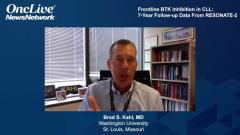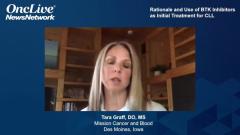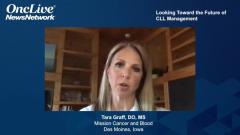
Frontline BTKi Therapy in CLL: The ELEVATE-TN Study 4-Year Follow-up
Expert insight on the use of frontline BTK inhibitor monotherapy over combination therapy in CLL regarding the ELEVATE-TN trial’s readout.
Episodes in this series

Tara Graff, DO, MS: How do we treat people? Do we treat them with monotherapy using acalabrutinib, or do we need the combination with an anti-CD20? In my practice, it’s patient specific. When we look at the ELEVATE-TN study, we see that both acalabrutinib monotherapy and acalabrutinib with obinutuzumab are very efficacious in terms of PFS [progression-free survival] and overall response rates. They maintain their efficacy across all the high-risk subgroups, including patients with bulky disease or who are older. They continue to do very well regardless of whether acalabrutinib was used as monotherapy or in combination.
It’s very patient specific. If I have an older patient, and even in some of my younger patients, depending on their burden of disease, I’ll just use acalabrutinib monotherapy, and they do very well. Especially in the day and age of COVID-19, adding in that anti-CD20 adds extra adverse effects and concerns with immunosuppression. It’s something to consider in the last year or so that maybe wouldn’t have been as big of a deal before.
Where I always use combination therapy is with my younger patients with high-risk disease and heavy disease burden. If they have a 10-cm lymph node that’s obstructing something, or if they’re really symptomatic, I’ll go ahead and use acalabrutinib plus obinutuzumab. I feel they do better having both agents on board. That’s traditionally how I’ve been making my decision. But it’s very patient specific. In the majority of them, I’m using acalabrutinib monotherapy, and they’re doing very well. The 4-year follow-up data show us that they’ve continued to do well in both the acalabrutinib-monotherapy group and the acalabrutinib-plus-obinutuzumab group in terms of PFS, overall survival, and overall response rate. As they were on it longer, the data were consistent. Patients continue to do very well. It’s very reassuring when making those decisions.
If I had a young patient, let’s say a 58-year-old man with a 17p deletion, and a 58-year-old woman without 17p deletion, as long as they didn’t have significant disease burden, I’d treat them the same. I’d give both acalabrutinib monotherapy because we know that acalabrutinib monotherapy has excellent PFS and overall response rate in both groups, whether the deletion 17p is present or not. The only time I would change my decision is if the disease burden were high, if they had a giant lymph node causing lymphedema, blockage of something important, or pain in general. Then I would I use combination therapy, but only if that circumstance was present.
As long as the patient doesn’t come in wanting fixed-duration therapy, I’d still use acalabrutinib because it’s very well tolerated. The data are excellent. The adverse-effect profile is great. Without that high disease burden, whether the patient is younger or older, I’d still use acalabrutinib monotherapy. If it was a patient who insisted on a fixed duration and didn’t want to have to be on something for the rest of their lives, only then would I consider using something different entirely. But in those 2 scenarios, as long as fixed duration isn’t an issue, I’d use acalabrutinib monotherapy, as long as there isn’t high disease burden or tumor burden.
TRANSCRIPT EDITED FOR CLARITY















































